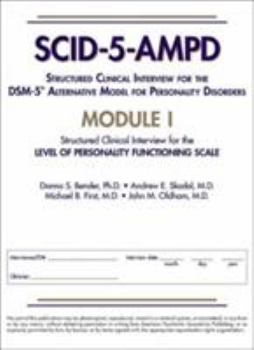Structured Clinical Interview for the Dsm-5(r) Alternative Model for Personality Disorders (Scid-5-Ampd) Module I: Level of Personality Functioning Sc
The Structured Clinical Interview for the DSM-5 Alternative Model for Personality Disorders (SCID-5-AMPD) meets a timely need. The Alternative Model for Personality Disorders in DSM-5 has ushered in a consensus and an upswing in research that has shifted from a categorical diagnosis of personality disorders toward a dimensional approach. Before now, no interview-based procedure has been available for applying the Alternative Model. Expertly designed, the Structured Clinical Interview for the DSM-5 Alternative Model for Personality Disorders (SCID-5-AMPD) is a semistructured diagnostic interview that guides clear assessment of the defining components of personality pathology as presented in the DSM-5 Alternative Model. The modular format of the SCID-5-AMPD allows the researcher or clinician to focus on those aspects of the Alternative Model of most interest.
Module I: Structured Clinical Interview for the Level of Personality Functioning Scale is devoted to the linchpin of dimensional assessment--self and interpersonal functioning--using the Level of Personality Functioning Scale. Module I provides both a global functioning score and an innovative, detailed assessment of all four domains of functioning (Identity, Self-Direction, Empathy, and Intimacy) and their corresponding subdomains.
Module I can be used independently or in combination with any of the following SCID-5-AMPD modules: - Module II dimensionally assesses the five pathological personality trait domains and their corresponding 25 trait facets. - Module III comprehensively assesses each of the six specific personality disorders of the Alternative Model, as well as Personality Disorder-Trait-Specified.
Also available is the User's Guide for the SCID-5-AMPD: the essential tool for the effective use of any SCID-5-AMPD module. This companion guide provides instructions for each SCID-5-AMPD module and features completed samples of all modules in full, with corresponding sample patient cases and commentary.
Trained clinicians with a basic knowledge of the concepts of personality and personality psychopathology will benefit from the myriad applications and insights offered by the SCID-5-AMPD.





